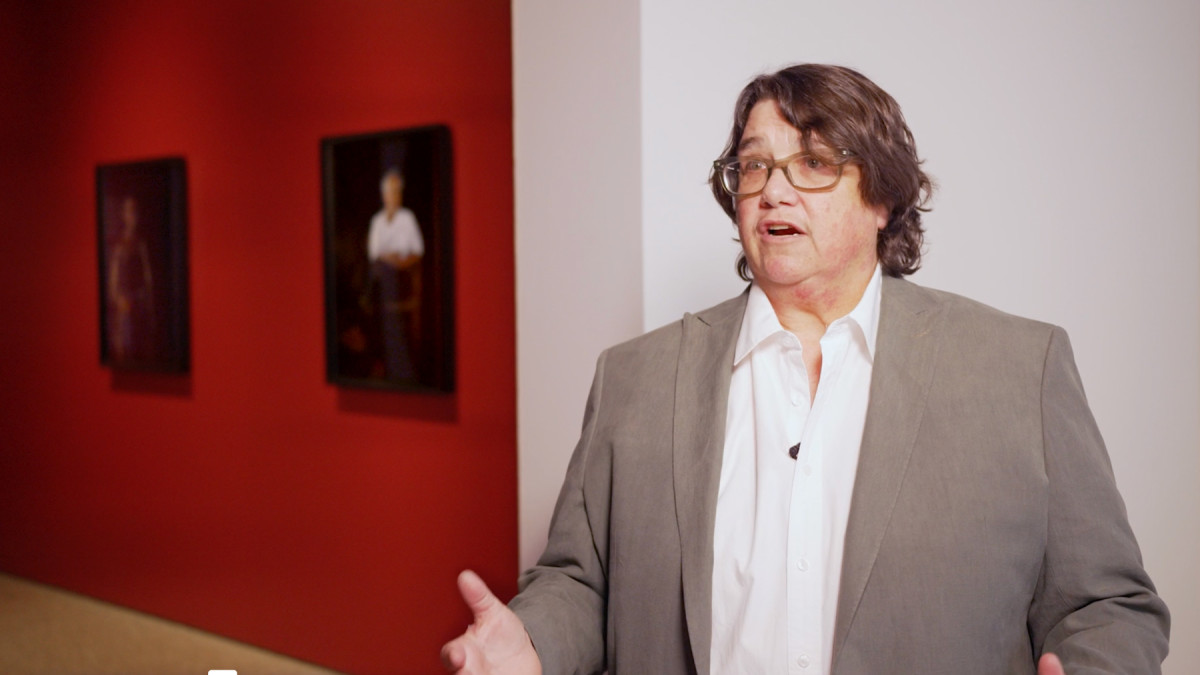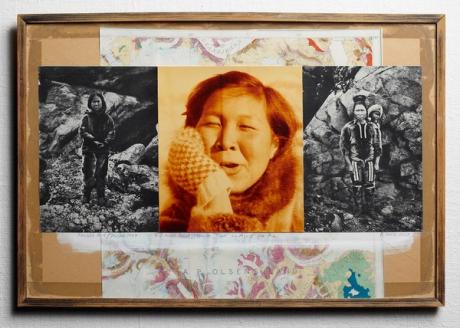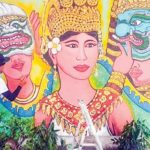Patient Admission, US Naval Hospital Ship Mercy, Vietnam
2010 - Photography (Photography)
40H x 56.5 inches
An-My LE
The print Patient Admission, US Naval Hospital Ship Mercy, Vietnam (2010) features an Asian Buddhist monk and an American Navy Solider on board the Mercy ship –one of the two dedicated hospital ships of the United States Navy– sitting upright in their chairs and adopting the same posture. In the background, the steel pillars creates a division of space implying a separation the two men according to their geographic regions of origin or residence, their vocations, their ethnicities, and their attitudes toward war. Yet, the mirrored body language of the two characters also suggests their reconciliation into a dialogue perhaps characterized by the protagonists’ physical and spiritual conversation. This photograph translates the artist’s ambivalence about military action. But this ambivalence becomes intrinsically complicated through LÊ’s rich use of color renders the kaleidoscopic shifts of terrain and sudden intrusion of beauty, atmosphere and psychology within her observations if the military at work. The heightened aesthetics qualities become unsettling, precisely because they counter the horrific violence that we expect from wartime imagery, as well as our collective historical memory of such extreme traumas as the Vietnam War. LÊ’s image, by extension, adds a disconcertingly glossy veneer to a moment of stasis, as if to suggest that war and military intervention are defined just as much by the quiet moments in between battle as they are by violence itself.
An-My LÊ arrived in the United Sates in 1975 as a war refugee from Vietnam. LÊ is a prolific photographer whose work blurs presumed boundaries between documentary and portrait photography. Her more recent work displays a rich use of color and an aesthetic beauty that belies the horrific imagery associated with violent combat. In such, her photographs also challenge the limits of reportage by suggesting that all representation is, on some level, fabricated for the camera and that the underlying narratives that we as viewers presume are never exactly what they seem.
Colors:
Related works of genres: » 21st-century american photographers
» see more

© » KADIST
Gregory Crewdson
2005Forest Gathering N.2 is part of the series of photographs Beneath the Roses (2003-2005) where anonymous townscapes, forest clearings and broad, desolate streets are revealed as sites of mystery and wonder; similarly, ostensibly banal interiors become the staging grounds for strange human scenarios...

© » KADIST
Matt Lipps
2011In the series Horizons (2010), Lipps uses appropriation to riff on Modernism’s fascination with abstract form...

© » ROYAL ACADEMY
Catherine Opie
Video: Catherine Opie on photographing leading British artists | Blog | Royal Academy of Arts Catherine Opie in the RA Collection Gallery Video: Catherine Opie on photographing leading British artists Read more Become a Friend Video: Catherine Opie on photographing leading British artists Published 8 September 2023 Catherine Opie discusses her portraits of David Hockney, Anish Kapoor, Gillian Wearing, Isaac Julien and Lynette Yiadom-Boakye, featured in our free display in the Collection Gallery...
Related works featuring themes of: » Black-and-White Photography, » Collective History, » Cultural Commentary, » Documentary Photography, » Human Figure
» see more

© » KADIST
Tina Modotti
1927Modotti’s Diego Rivera Mural: Billionaires Club; Ministry of Education, Mexico D...

© » KADIST
Walead Beshty
2012Constructed out of metal or glass to mirror the size of FedEx shipping boxes, and to fit securely inside, Walead Beshty’s FedEx works are then shipped, accruing cracks, chips, scrapes, and bruises along the way to their destination...

© » KADIST
Catherine Opie
1993Like many of Opie’s works, Mike and Sky presents female masculinity to defy a binary understanding of gender...

© » KADIST
Hank Willis Thomas
2014South Africa Righteous Space by Hank Willis Thomas is concerned with history and identity, with the way race and ‘blackness’ has not only been informed but deliberately shaped and constructed by various forces – first through colonialism and slavery, and more recently through mass media and advertising – and reminds us of the financial and economic stakes that have always been involved in representations of race....
Other related works, blended automatically
» see more

© » APERTURE
An-My LE
For the past two decades, An-My Lê has used photography to examine her personal history and the legacies of US military power, probing the tension between experience and storytelling....

© » KADIST
Tina Modotti
1927Modotti’s Diego Rivera Mural: Billionaires Club; Ministry of Education, Mexico D...

© » KADIST
Walead Beshty
2012Constructed out of metal or glass to mirror the size of FedEx shipping boxes, and to fit securely inside, Walead Beshty’s FedEx works are then shipped, accruing cracks, chips, scrapes, and bruises along the way to their destination...

© » KADIST
Glenn Ligon
2000Glenn Ligon’s diptych, Condition Repor t is comprised of two side-by-side prints...
Related works sharing similar palette
» see more

© » KADIST
Wade Guyton
2016This untitled print by Wade Guyton depicts an iteration of elements that are characteristic of the artist’s work...

© » THEARTNEWSPER
A new wave: spate of UK exhibitions signal growing recognition for Inuit and Sámi art Art market Museums & heritage Exhibitions Books Podcasts Columns Technology Adventures with Van Gogh Search Search Exhibitions news A new wave: spate of UK exhibitions signal growing recognition for Inuit and Sámi art Shows in London, Southampton and St Ives are introducing a wider audience to the work of artists from the far north Alexander Morrison 7 February 2024 Share Pia Arke's Krabbe 1906/Jensen 1947 is an example of how the artist blended “the personal with the political” Courtesy and © Pia Arke Estate Two years on from the last major milestone, the push for representation of art from the far north appears to have reached another...

© » ARTS EQUATOR
An orphaned artist paints for support (via The Phnom Penh Post) | ArtsEquator Thinking and Talking about Arts and Culture in Southeast Asia ArtsEquator Radar July 5, 2018 Self-taught artist Yi Kakada has spent the past six years demonstrating his skills by painting on walls, fences and other public areas, often without getting paid...
Related works from the » 2010's created around » New York, New York
» see more

© » KADIST
Chris Wiley
2012Architectural details become abstracted renderings in Chris Wiley’s inkjet prints 11 and 20 (both 2012)...

© » KADIST
Oded Hirsch
2012Oded Hirsch’s video work Nothing New (2012) utilizes seemingly absurdist tropes to raise more trenchant questions about communal action and collective identity in modern day Israel...

© » KADIST
Hank Willis Thomas
2014South Africa Righteous Space by Hank Willis Thomas is concerned with history and identity, with the way race and ‘blackness’ has not only been informed but deliberately shaped and constructed by various forces – first through colonialism and slavery, and more recently through mass media and advertising – and reminds us of the financial and economic stakes that have always been involved in representations of race....
Other works by: » An-My LE
» see more

© » APERTURE
An-My LE
For the past two decades, An-My Lê has used photography to examine her personal history and the legacies of US military power, probing the tension between experience and storytelling....
Related works found in the same semantic group
» see more

© » KADIST
Walead Beshty
2011Constructed out of metal or glass to mirror the size of FedEx shipping boxes, and to fit securely inside, Walead Beshty’s FedEx works are then shipped, accruing cracks, chips, scrapes, and bruises along the way to their destination...

© » KADIST
Pablo Accinelli
2011In Onde quer que voce esteja (2011) Accinelli sets up a row of cardboard shipping tubes of varying heights and inscribes on them in black ink the words of the title, which translates in English as “Wherever you may be.” The words, while legible, seem like fragmented lines and shapes—almost but not quite a deconstruction of the text...





